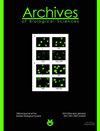Variability of the HCV core region and host genetic and epigenetic factors can predict the response to pegylated interferon/ribavirin therapy in genotype 1B hepatitis C patients from Serbia
IF 0.8
4区 生物学
Q4 BIOLOGY
引用次数: 0
Abstract
Variations in the hepatitis C virus (HCV) core sequence have been related to disease progression and response to antiviral therapy. Previously we showed that the methylation status of RASSF1A and p16 genes, and IL28B genotypes affects the response to pegylated interferon/ribavirin (PEG-IFN/RBV) therapy. Herein we investigated whether amino acid (aa) substitutions in the HCV core region alone or in combination with IL28B genotypes and RASSF1A/p16 methylation affect the response to PEG-IFN/RBV therapy and liver disease progression. Among 29 examined patients, we found no association between single aa substitutions and response to therapy. However, we observed that patients with the HCV core aa substitution at position 75 and CT/TT IL28B genotypes were nonresponders (NR), (P=0.023). Moreover, these patients had unmethylated RASSF1A. In contrast, most patients (75%) with aa substitutions at position 91 and CC IL28B genotype achieved sustained virologic response (SVR), (P=0.030), and 70% of them had methylated RASSF1A gene. Our results suggest that combined analysis of aa substitutions in the core protein, the IL28B rs12979860 polymorphism, and the methylation status of the RASSF1A gene may help in predicting treatment response to PEG-IFN/RBV in genotype 1b chronic hepatitis C patients.HCV核心区和宿主遗传和表观遗传因素的变异性可以预测塞尔维亚基因1B型丙型肝炎患者对聚乙二醇化干扰素/利巴韦林治疗的反应
丙型肝炎病毒(HCV)核心序列的变异与疾病进展和对抗病毒治疗的反应有关。先前我们发现RASSF1A和p16基因的甲基化状态以及IL28B基因型影响对聚乙二醇化干扰素/利巴韦林(PEG-IFN/RBV)治疗的反应。在这里,我们研究了HCV核心区域的氨基酸(aa)替换是否单独或与IL28B基因型和RASSF1A/p16甲基化联合影响对PEG-IFN/RBV治疗的反应和肝脏疾病的进展。在29例被检查的患者中,我们没有发现单个aa替代与治疗反应之间的关联。然而,我们观察到HCV核心aa替换75位和CT/TT IL28B基因型的患者无应答(NR), (P=0.023)。此外,这些患者具有未甲基化的RASSF1A。相比之下,大多数(75%)在91位aa替换和CC IL28B基因型的患者获得了持续的病毒学应答(SVR), (P=0.030),其中70%的患者RASSF1A基因甲基化。我们的研究结果表明,综合分析核心蛋白的aa替换、IL28B rs12979860多态性和RASSF1A基因的甲基化状态可能有助于预测基因1b型慢性丙型肝炎患者对PEG-IFN/RBV的治疗反应。
本文章由计算机程序翻译,如有差异,请以英文原文为准。
求助全文
约1分钟内获得全文
求助全文
来源期刊
CiteScore
1.40
自引率
0.00%
发文量
25
审稿时长
3-8 weeks
期刊介绍:
The Archives of Biological Sciences is a multidisciplinary journal that covers original research in a wide range of subjects in life science, including biology, ecology, human biology and biomedical research.
The Archives of Biological Sciences features articles in genetics, botany and zoology (including higher and lower terrestrial and aquatic plants and animals, prokaryote biology, algology, mycology, entomology, etc.); biological systematics; evolution; biochemistry, molecular and cell biology, including all aspects of normal cell functioning, from embryonic to differentiated tissues and in different pathological states; physiology, including chronobiology, thermal biology, cryobiology; radiobiology; neurobiology; immunology, including human immunology; human biology, including the biological basis of specific human pathologies and disease management.

 求助内容:
求助内容: 应助结果提醒方式:
应助结果提醒方式:


